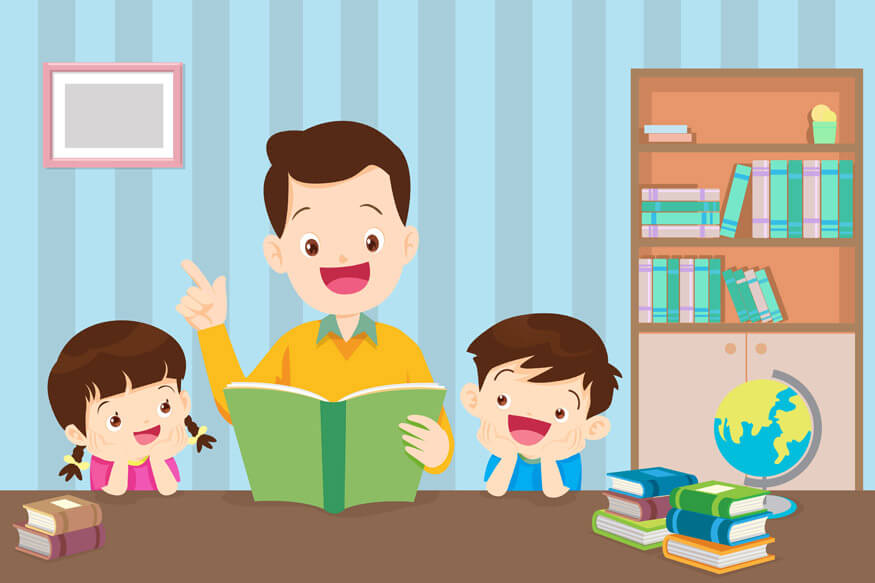Reading is one of the most critical activities in a child’s learning journey. A major share of the learning happens through the reading of books, articles, newspapers, essays, and other written formats. Reading is not just about verbalising the words in your mind. A good reading habit influences your speed of reading, your concentration while reading, your ability to retain what you are reading, how much strain you put on your eyes while you are reading, etc. If you look around, you’ll see certain individuals who are voracious readers, while others dislike reading. A large part of this could be attributed to the way we read. Good reading practices can make reading a fun experience for children which is a critical asset to have in your learning journey. This blog presents certain techniques that can be used to teach kids how to read.
Also Read: Effective Ways to Build Pre-Reading Skills in Kids
Sound of words
The typical starting point in forming a reading habit is for children to learn the sound of words. This process is called phonics where children learn to read a word and learn to associate that word with a particular sound. This is also where pronunciations come into the picture. Phonics is a key aspect of reading as this is how children learn to identify and relate to words. Without the sound, the word they are reading may not carry much meaning for them. This could be a time-consuming task but is a critical groundwork for the foundational formation of reading skills.
Sound of alphabets
Just like associating sounds with words, children can also be taught to associate sounds with the alphabet. It is another essential step in teaching children how to read. Teachers can use various methods such as flashcards, songs, or rhymes to teach letter sounds to children. Songs and rhymes are usually the best way of learning the sound of the alphabet in a fun and engaging manner that is highly retentive as well.
Sight Words
The next step could be to teach children sight words. These are the most common words used in the English language. Words such as “the”, “it”, “and” appear so frequently that children must learn to read through them very quickly without necessarily associating a sound with them. Developing a large vocabulary of sight words helps improve their reading speed and fluency.
Word Families
Teaching word families is another useful way to build word associations for children. It is a useful technique in developing a robust reading technique in children. Word families are formed based on a common base word. For example, word, reword, wordy, wordsmith, wording, wordless, etc could belong to the same word family with “word” as the base word. With an understanding of the base word, children are also able to pronounce and decipher the meaning of new words they might encounter belonging to the word family known to them.
Word families can also be formed based on a similar ending sound, for example, name, shame, blame, flame, etc could be part of a phonic word family. Word families are a great way for children to learn new words.
Also Read: 15 Importance of Reading Skills and Benefits
Stories
Once the kids have developed a basic understanding of words and phonics, reading stories is the next step in the reading journey. Reading stories is the best way to motivate children to read and develop their reading habits. When it comes to reading, the best way to learn is to read more and more. The more you read, the better you become at reading. There are no shortcuts to this. The journey can start with small children listening to stories narrated by their teachers or parents. Then they can slowly graduate to reading stories themselves. It is suggested to start them off with more visual stories and then gradually transition to more word-based stories. The initial stories are very critical as they will form the first impressions of kids towards reading. Keeping this in mind the initial books that the kids read need to be very carefully curated to spark their long-term interest in reading.
Parents and teachers can also experiment with various formats of reading such as books, magazines, picture stories, comics, etc to see what works for their children. Children can gradually be also exposed to a variety of genres of books such as fiction, non-fiction, adventure, mythology, etc They can then pursue the genres that they enjoy reading the most.
Reading Games
Another way to make reading fun is by engaging children in reading-based games. The internet, especially YouTube is full of reading-based games which are fun and engaging at the same time promoting the practice of reading in small children. Various offline reading-based activities can also be designed to engage children in fun sessions of reading.
Set out a ritual around reading
To build a robust reading habit, a time of the day can be set out as reading time. Just before going to bed, for example, could be a good time to allocate for reading. This reading slot must be sacrosanct and children must be encouraged to read independently during this slot. It will also help children get sound sleep. Sleep will also drive the assimilation process for whatever the children have read just before bedtime. This ritual will also lead to the formation of a lifelong reading habit which has immense benefits throughout their lives.
Monitor Progress
Monitoring is an essential part of achieving any outcome. Teachers and parents need to keep a close eye on the progress children are making in their reading journey. If they are facing any reading-related issues, such as dyslexia, this monitoring will help in early identification of the same. Through monitoring, corrective measures can also be taken depending on the strong areas and areas of improvement respectively for the kids.
Reading is frequently associated with the education and knowledge level of individuals. Those who appear to be “well-read” are respected and looked up to in society. Most global leaders and achievers have confessed to them being voracious readers. A habit of reading is, without doubt, an essential ingredient to success in life in the long run.
Also Read: Top 10 Benefits of Reading Bedtime Stories For Kids










